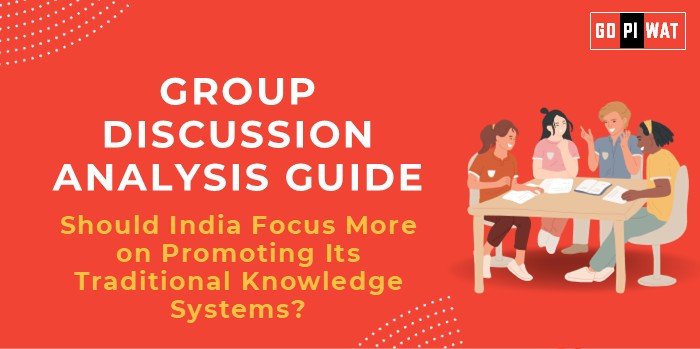🌟 Group Discussion (GD) Analysis Guide
📜 Should India Focus More on Promoting Its Traditional Knowledge Systems?
🌐 Introduction to the Topic
Opening Context: “India’s rich heritage of traditional knowledge systems, including Ayurveda, Yoga, and Vastu Shastra, is increasingly recognized globally. These systems represent India’s cultural identity and offer unique solutions for modern challenges in healthcare, architecture, and sustainability.”
Topic Background: Rooted in ancient scriptures like the Vedas and Upanishads, traditional knowledge systems have been integral to Indian life for centuries. Recently, initiatives like International Yoga Day and the AYUSH Ministry’s promotion of Ayurveda have spotlighted these treasures.
📊 Quick Facts and Key Statistics
- Global Yoga Market: Valued at $88 billion (2023), with India contributing 15% of global practitioners.
- Ayurveda Industry: Estimated to grow at a CAGR of 15.6%, reaching ₹1.2 trillion by 2025.
- Cultural Exports: Yoga and Ayurveda rank among the top five cultural exports of India.
- Biodiversity: India hosts 7% of the world’s biodiversity, pivotal for traditional medicines.
- UNESCO Heritage: Yoga declared an Intangible Cultural Heritage in 2016.
👥 Stakeholders and Their Roles
- Government: AYUSH Ministry, ICAR, and other bodies develop policies, promote research, and secure international patents.
- Private Sector: Ayurvedic brands like Patanjali and Dabur commercialize traditional practices.
- Global Institutions: WHO endorses traditional medicine; UNESCO recognizes cultural heritage.
- Academia and NGOs: Promote research, education, and integration with modern systems.
🎯 Achievements and Challenges
✔️ Achievements
- International Yoga Day reaches 190+ countries.
- Ayurveda integrated into WHO’s Global Centre for Traditional Medicine in India.
- Significant growth in the export of herbal products.
❌ Challenges
- Limited research to validate traditional practices.
- Intellectual property theft and biopiracy.
- Perceived lack of modernization.
🌍 Global Comparisons
- China: Integration of Traditional Chinese Medicine (TCM) into healthcare systems.
- Case Studies: Kerala leading in Ayurveda tourism; Himachal Pradesh conserving medicinal plants.
⚖️ Structured Arguments for Discussion
- Supporting Stance: “India’s traditional knowledge systems not only enrich cultural heritage but offer sustainable solutions in healthcare and environmental management.”
- Opposing Stance: “Focusing on traditional knowledge without scientific validation risks credibility and misallocation of resources.”
- Balanced Perspective: “India must integrate traditional knowledge with modern science to maximize its global appeal and relevance.”
🗣️ Effective Discussion Approaches
- Opening Approaches:
- “India’s global recognition for Yoga highlights the soft power of traditional knowledge systems.”
- “China’s success with TCM underscores the potential of integrating traditional practices into mainstream systems.”
- Counter-Argument Handling:
- Emphasize research integration and evidence-based validation.
- Highlight successful models like Kerala Ayurveda tourism.
🔍 Strategic Analysis of Strengths and Weaknesses
- Strengths: Cultural identity, global demand, biodiversity.
- Weaknesses: Lack of scientific validation, limited funding.
- Opportunities: Global markets, wellness tourism, policy support.
- Threats: Competition from other nations, loss of intellectual property.
📚 Connecting with B-School Applications
- Real-World Applications: B-school projects in sustainability, healthcare management, and cultural marketing.
- Sample Interview Questions:
- “How can traditional knowledge contribute to India’s sustainable development goals?”
- “What role does intellectual property play in protecting traditional systems?”
- Insights for B-School Students:
- Importance of global marketing.
- Role of policy advocacy.
- Integration strategies with modern sectors.


